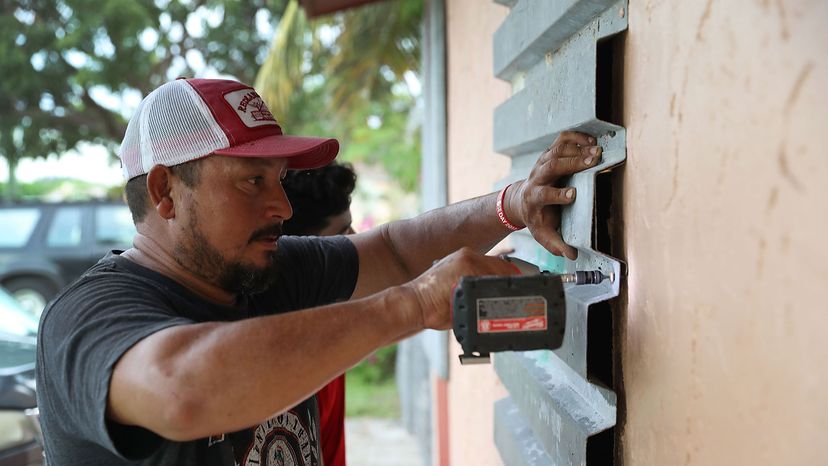
Image: Joe Raedle/Getty Images
About This Quiz
From hurricanes, to earthquakes, to tornadoes, there's no shortage of potential disasters that can ruin homes and devastate lives. Think you're ready to survive the next disaster? Find out with our quiz.
Where's the best place to hide during an earthquake?
under a very sturdy table
Contrary to popular belief, doorways really aren't much safer than other areas of a modern building. If you're stuck inside when a tremor begins, hide under a very sturdy table or similar object to protect yourself from falling debris.
beneath a doorway
in the bath tub
If a tornado may strike your area, what should you do regarding your home's windows?
Open all of them.
Close all of them.
For decades, many people believed that opening windows reduced pressure inside homes during tornadoes. But the theory doesn't hold water, and actually, opening windows can let in high winds that may add more damage to the structure. Closed windows increase the chances that your home escapes major damage.
It makes no difference.
If a hurricane is coming, what's the best way to protect your home's windows?
Use tape to create a big "X" on each window. That will keep the glass from shattering.
Deploy your permanent storm shutters.
In hurricane-heavy areas, permanent storm shutters are the best protection for your windows. Plus, it beats having to nail plywood to your house (although that will work in a pinch). Tape simply ensures that the glass breaks into guillotine-sized pieces that can cause horrific bodily harm.
Nail down some plywood over the windows.
Advertisement
If a hurricane or other disaster is coming, what's one financial decision you should make?
Get extra cash in advance.
Didn't you watch "The Walking Dead"? When the power goes out, ATMs and banks are down for the count. Have extra cash on hand before the storm; otherwise, you won't have any way to pay for necessities.
Call your credit card company to increase your spending limit.
Get a shopping cart ready in case you need to loot.
According to the Dept. of Homeland Security (DHS), in your emergency kit, you should have enough food to las
three days
The DHS says you should have enough food to last three days. Of course, it couldn't hurt to have extra beyond this.
three weeks
three months
How much water per person should you have in your emergency kit (assuming a three-day supply)?
a half gallon (1.9 liters) per person per day
1 gallon (3.8 liters) per person per day
The DHS recommends 1 gallon per person per day, for three days.
2 gallons (7.6 liters) per person
Advertisement
If you have to use water that might not be clean, you'll need to treat it. What's the best way to do that?
Boil it for one minute.
Add 1/8 teaspoon of bleach per gallon.
Distill it.
While all these methods will kill microbes, distillation also gets rid of contaminants like heavy metals. Distillation involves inserting a cup into the pot of water, boiling it and collecting the vapor dripping from the pot lid into the cup.
If there is an active shooter in your building, what three words should you remember to determine what to do?
Shout, fight, run
Stop, drop, roll
Run, hide, fight
You should first run and try to escape the shooter. If that's not possible, try to hide. As a last resort, fight with anything you can lay your hands on.
When a major disaster strikes, how should you use your cell phone?
Keep the compass app loaded so you can't get lost no matter what.
Use it only for emergencies.
In the immediate aftermath of major disasters, cell phone towers are overloaded with frantic callers. Use your phone only for genuine emergencies so that people in real trouble can call for help.
Post some updates on social media.
Advertisement
If you own a home, what should you do long BEFORE a disaster strikes?
Apply fire retardant to the roof.
Replace your foundation with titanium poles.
Review your insurance policy.
It never fails - in the wake of disasters, many people call their insurance adjusters only to find out that certain problems, like flooding, weren't covered. That's why you should review your policy long before a disaster is on the horizon.
You Got:
/10
Joe Raedle/Getty Images